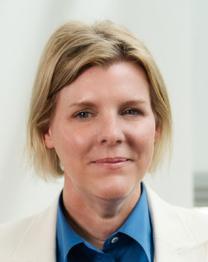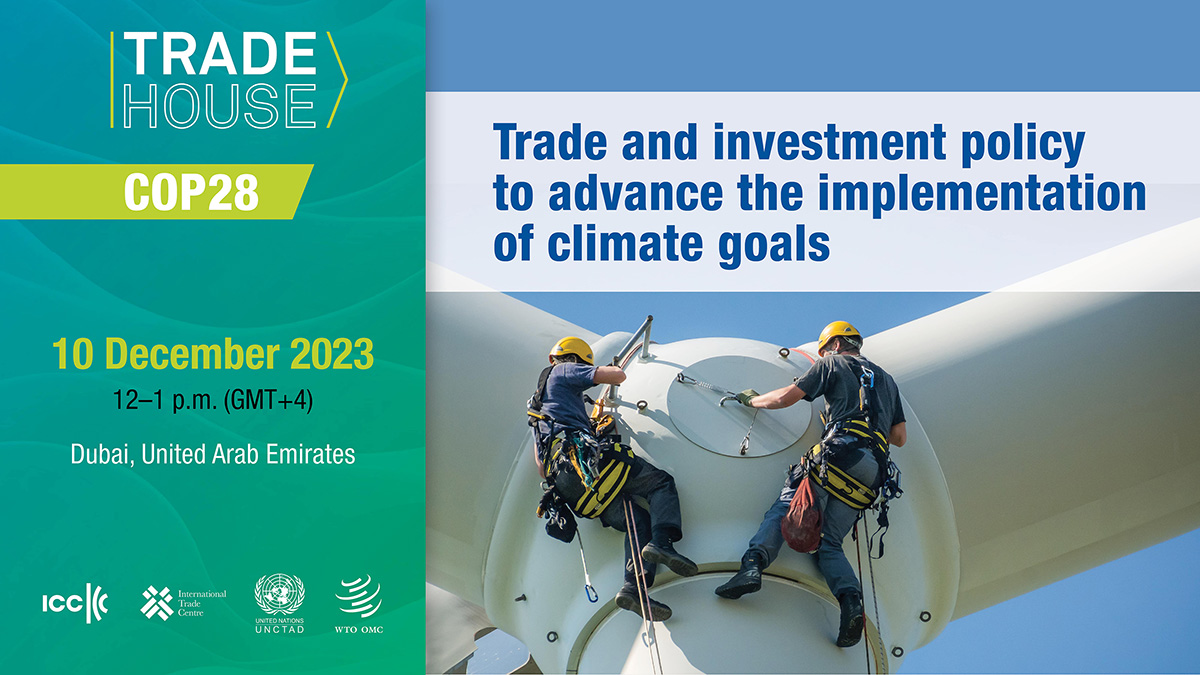
Trade, investment, and green industrial policies can help countries achieve carbon emission reductions set forth in their National Determined Contributions (NDCs). Trade-related measures such as tariffs, market-based mechanisms, subsidies, and technical regulations can facilitate energy transition, expand the market for carbon-efficient products, and facilitate the phasing out of unsustainable economic activities. However, they can also create trade barriers and impact the competitiveness of countries. International cooperation can facilitate developing countries' access to technologies necessary for the transition through trade.
Trade and investment are interdependent means for achieving climate goals and sustainable development. At a high-level event at COP27, participants encouraged collaboration between UNCTAD and WTO on how trade and investment policies could work together to support climate action.
UNCTAD’s World Investment Report 2023: Investment in Sustainable Energy for All calls for urgent support to developing countries to enable them to attract significantly more investment for their transition to clean energy. A concerted effort is essential to ensure successful implementation paths for NDCs while minimising the potential negative impact of policy measures in developing countries.
Recent work by UNCTAD identified almost 700 trade-related measures in NDCs and is a first effort to identify how trade is present in national climate plans systematically and its mostly untapped potential to contribute to advancing national climate goals. The WTO's World Trade Report 2022: Climate Change and International Trade, launched at COP27, and Trade Policy Tools for Climate Action, launched at COP28, highlight that trade is part of the solution to climate change and illustrate how Governments may use trade-related policy to ramp up their NDCs.
Based on the UNCTAD WIR 2023 findings, WTO's Trade Policy Tools for Climate Action and recent research on the contribution of trade, investment, and industrial policy to the implementation of NDCs, the session will identify opportunities, challenges and policy priorities to help advance climate change goals.
This event will be live streamed
Programme
Moderator:
- Ms. Chantal Line Carpentier, Head, Trade, Environment, Climate Change, and Sustainable Development, UNCTAD
Panelists:
- Mr. Aik Hoe Lim, Director, Trade and Environment Division, WTO
- Ms. Amelia Santos Paulino, Chief, Investment Research Section, Division on Investment and Enterprise, UNCTAD
- Ms. Karen Ernst, Head, Independent Integrity Unit, GCF
- Ms. Claudia Contreras, Economic Affairs Officer, UNCTAD
- Ms. Cynthia Yue, 2021-2022 UNA-USA Youth Observer to the United Nations
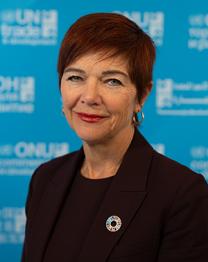
Dr. Carpentier, from Quebec, Canada, is Head of Trade, Environment, Climate change, and Sustainable Development Branch of UNCTAD’s Division on International Trade and Commodities (DTIC). Her work with governments and partners foster green, blue, circular, and impact economies that supported by trade, are key to addressing the triple planetary crisis: climate change, pollution and biodiversity loss. She came to Geneva after leading the UNCTAD New York office, representing the SG and coordinating UNCTAD’s support to inter-governmental negotiations of the UN General Assembly (2015-2023).
She held several other positions. At the UN Department of Economic and Social Affairs, she facilitated the engagement of NGOs, women and youth’s groups, business, local authorities, etc. in the SDGs negotiations and the UN Rio+20 Conference (2011-2015). She also supported the Commission on Sustainable Development research and negotiations on sustainable agriculture and sustainable consumption and production (2007-2011).
Prior to joining the UN, she Headed the North American Free Trade Agreement Commission for Environmental Cooperation’s, Environment, Economy and Trade Division (2000-2007), was Agro-environmental policy analyst for Winrock International (1998-2000) and post-Doctoral fellow/Brazil office manager for the International Food Policy Research Institute (1996-1998).
She has a PhD. in Agro-Environmental Economics from Virginia Tech, as well as a MSc. and BSc. in Agro- Economics from McGill University and is an ironman and ultramarathoner. She is a Yale World Fellow, received the 2023 Schwab Foundation for Social Entrepreneurship public intrapreneur award, and is a UNEP Who’s Who of Women and the Environment.
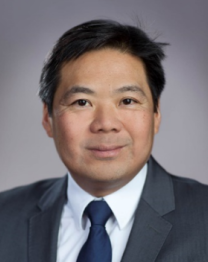
Aik Hoe Lim is Director of the Trade and Environment Division at the World Trade Organization and leads its work on environmental sustainability, climate change and trade, as well as on the Agreement on Technical Barriers to Trade. In this role, he has strengthened WTO's partnership with UNEP as well as other international environmental organizations. He led the establishment of WTO's Trade and Environment Week, which is now an annual flagship event for the organization. He joined the WTO in 1999 and served in the External Relations Division, the Director-General's Cabinet and the Trade in Services Division. He was previously Counsellor to two WTO Director-Generals, Advisor to the Director‑General's Consultative Group, and Secretary to WTO committees, working groups and negotiating bodies on services trade and domestic regulation. He represents the WTO in the UN Environmental Management Group and the UN Framework Convention on Climate Change, and is a member of the Advisory Board of the UNEP Global Environmental Outlook. Some of his publications include contributions to the "Research Handbook on Climate Change and Trade Law" (2017); "Win-Win: How International Trade Can Help Meet the Sustainable Development Goals" (2017); and an edited volume on "WTO Domestic Regulation and Services Trade" (2014).

Dr. Amelia U. Santos-Paulino is Chief of the Investment Issues at UNCTAD’s Division on Investment and Enterprise.
Previously, she was a Senior Economist at UNCTAD’s Africa, Least Developed Countries and Special Programmes Division. Before joining UNCTAD, she was Research Fellow and Project Director in the United Nations University’s World Institute for Development Economics Research (UNU-WIDER) in Helsinki, Professorial Research Fellow in the University of Sussex’s Institute of Development Studies, and Senior Research Economist in the Central Bank of the Dominican Republic.
She served as Senior Adviser of the Dominican Republic’s Government on International Trade and Investment for the negotiations of the US-DR-CAFTA Free Trade Agreement, amongst other full-time posts within the civil service and academia of the Dominican Republic. She has also held visiting posts at the University of California, Davis, the Graduate Institute of International and Development Studies in Geneva, Fudan University in Shanghai, and the Asian Development Bank Institute in Tokyo.
Her work has been published in journals including the Economic Journal, Cambridge Journal of Economics, and World Development, and has also edited books published by Oxford University Press and Cambridge University Press.
She holds PhD and MA degrees in Economics from the University of Kent in the UK.
Karen is a strategic leader, partnership builder, and trusted advisor with a passion for supporting the missions of international organisations. With her expertise in international law, integrity, compliance, and good governance, she drives and implements objectives, fostering a culture of integrity, transparency, and collaboration across global teams.
Before joining IIU, Karen served as the International Director of Integrity, Compliance & Legal at SOS Children's Villages International, where she was part of the extended executive leadership team. In this role, she successfully led the integrity and asset safeguarding functions and strengthened good governance within the SOS Children's Villages Federation.
Prior to her tenure at SOS Children's Villages, she held various legal positions in the fields of anti-fraud, anti-corruption, anti-harassment, and international technical and scientific collaboration at the European Organization for Nuclear Research (CERN) and the European Organisation for the Exploitation of Meteorological Satellites (EUMETSAT).
Karen holds several law degrees, including a Master of Laws (LL.M.) in International Legal Studies, First and Second State/Bar Examinations in Law, as well as an Executive Master in Public Administration.
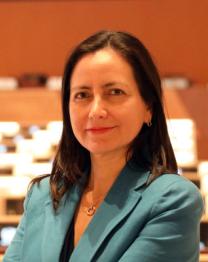
Dr. Claudia Contreras joined UNCTAD in 2013.
Since 2020, she is an Economic Affairs Officer at the Trade, Environment and Sustainable Development Branch. Her work is focused on the interlinkages between climate change, environment, and trade and development.
Formerly, Claudia was a member of the Secretariat of the United Nations Commission on Science and Technology for Development (CSTD), and worked for the Chilean government on science, technology, and innovation policy.
Claudia holds a BSc in Economics from the University of Chile and graduated with an MSc in Management Research and a PhD in Development Studies from the University of Oxford.
Cynthia Yue is the 2021-2022 UNA-USA Youth Observer to the United Nations.
A Tennessee native and a recent graduate of George Washington University, she has spent the past year connecting with young people across the United States about the issues that matter most to them and how they can harness their power for good. Yue has spent more than seven years as a volunteer leader at UNICEF USA and previously served on their National Council and as a UNICEF Global Youth Ambassador.
During her tenure as UN Youth Observer, she collaborated with Asian Mental Health Project on an initiative to encourage young people to communicate with their parents and elders about mental health and founded the Social Justice Series to hold conversations on advocacy, antiracism, and social justice — both locally and globally.
Yue is committed to tackling some of the world’s biggest challenges — from mental health and climate change to poverty and gender equality — to make the world a better place for all.



